817 Search Results for praactical teaching
March 30, 2014
by Carole Zangari -
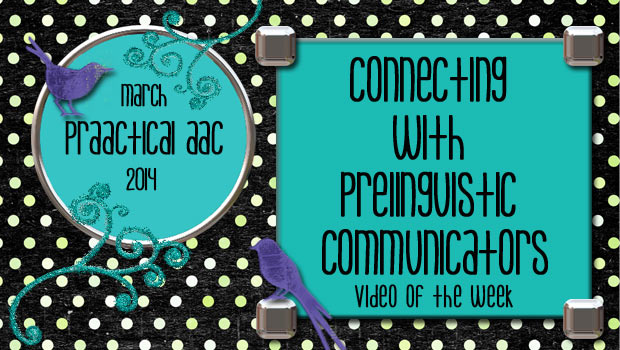
In our video post this week, we’re sharing a number of video clips demonstrating interactions between children with vision and hearing loss and their interventionists. We love the child-directed nature of the interactions and the contingent responses from the adults. The connections they are making strengthen the foundation for future language development. Take a look. Direct Link to Videos: http://vimeo.com/search?q=teaching+prelinguistic+communication
March 19, 2014
by Carole Zangari -
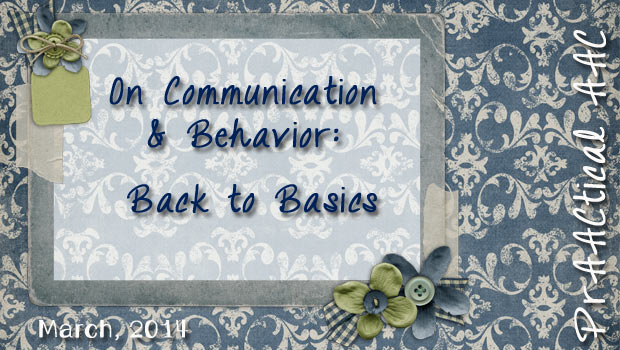
The other day we heard from an SLP who was supporting a child with significant communication difficulties. She contacted us because the team had hit a snag in their communication supports for this student. The student was successfully able to communicate with PECS but rarely did so. Instead, she used her body and challenging behavior to express herself most of the time. “Why does she hit when she can use her PECS book to tell us what she wants?” We’re not any more clairvoyant than you are, but we certainly had some ideas about this. Functional Communication Teaching can be very effective in helping people reduce their use of challenging behaviors in favor of more socially accepted means of communication. BUT, there are some of the basic principles that are have to be attended to when designing and implementing a set of behaviors that will replace the challenging behavior. This... [Read More...]
March 17, 2014
by Carole Zangari -
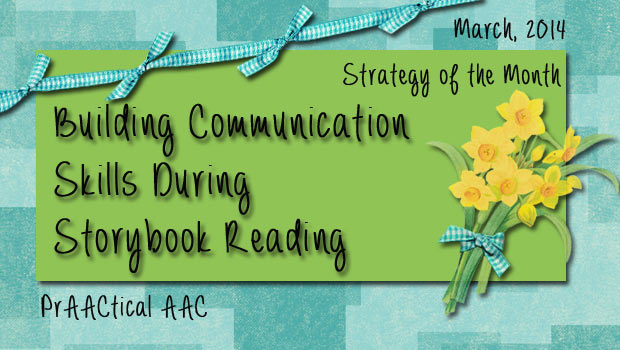
In this post, we continue to explore strategies for advancing the literacy experiences of people who use AAC. Today, we’ll look at a strategy used in the research of Drs. Cathy Binger and Jennifer Kent-Walsh. What is a little different about this strategy is that it uses literacy experiences, specifically storybook reading, to build communication skills. One component of their research focuses on an interactive reading strategy called RAAP: Read, Ask, Answer, Prompt. There is lots to love about this approach, but one of our favorite things is that is makes heavy use of aided language input, an intervention strategy that is critical for partners of beginning communicators to use. You can read more about aided language input and see videos here. It also gets partners using language expansions and extensions, an intervention strategy that is effective for communicators at many levels of proficiency. Finally, we appreciate the frequent use of... [Read More...]
March 11, 2014
by Carole Zangari -
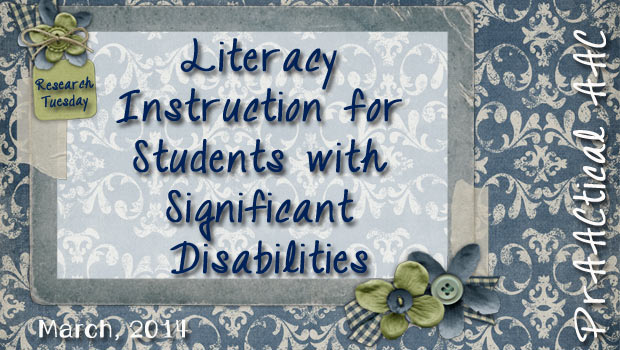
We all remember certain ‘firsts’ – your first bike, your first plane ride, your first car. One of my memorable ‘firsts’ is the first book I was ever given that was ‘just for me.’ I have fond memories of lazy summer afternoons with The Wishing Well, one of the Alice and Jerry basal readers. I may have broadened my library since that was given to me for my 4th birthday, but it still sits on my shelf and just paging through it brings back memories of being transported to another world. We can hardly imagine what life would be like without books. Reading brings us more than information. It allows us to explore, escape, relax, and dream. What must it be like to be deprived of the chance to learn and enjoy the printed word? Sadly, that is the reality for too many children and adults with AAC needs. In... [Read More...]
March 6, 2014
by Carole Zangari -
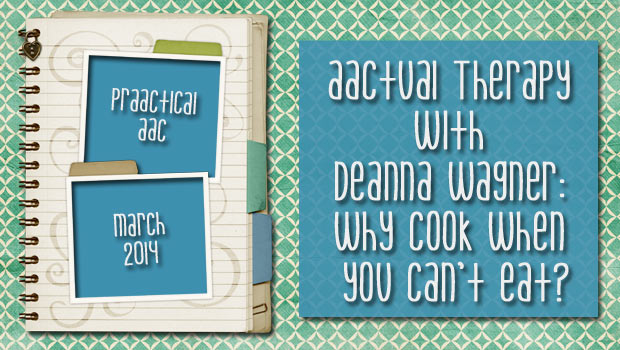
One of our prAACtical friends loves to think about, talk about, and participate in anything to do with baking. Not all that unusual unless you consider that he has a g-tube and doesn’t eat in the conventional sense. So we were incredibly excited have this guest post by SLP Deanna Wagner, whose prAACtical ideas for teaching AAC using cooking activities appealed to us right away. You can read more about Deanna here. Why Cook When You Can’t Eat? I have been thinking about writing this post for a number of weeks, now. And have come up with many different answers to this question, “Why cook when you can’t eat?” I finally decided I should just talk about how we use cooking activities to reinforce communication skills and let the reader can come up with his/her own answer to this question. Whether I am working in a school classroom or with adults... [Read More...]
February 24, 2014
by Robin Parker -

Positive Reinforcement has a lot of power but it is a lot more than making a learner feel good about themselves. Positive reinforcement is the response to a behavior that will make that behavior occur again. In AAC and teaching terms, we are often thinking about a communicative or language behavior. We can also be thinking about a participation behavior that will allow a learner to have more access to meaningful language experiences. We are not usually thinking about ‘good art’ or ‘great work’. By keeping in mind some top positive reinforcement strategies, you will be prepared to have varied individualized strategies that will make it most likely that the communication behaviors you are teaching will spontaneously occur again and again. Power Positive Reinforcement Strategies for AAC Learners: Natural Positive Reinforcers– It is naturally reinforcing to ask for an item and then be given that item. It is naturally reinforcing... [Read More...]
February 17, 2014
by Carole Zangari -
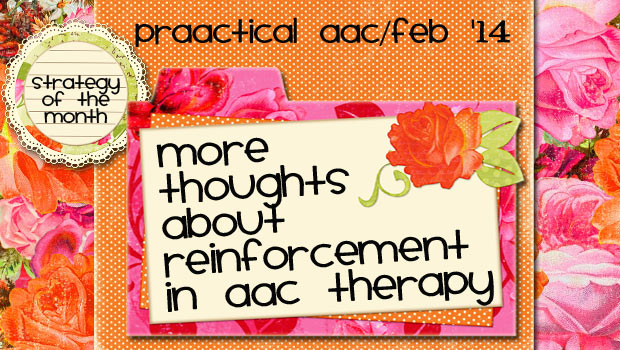
When we’re teaching AAC, our preferred means of responding to learners is with natural consequences, expansions, extensions, and verbal encouragement. Here are some of our prAACtical thoughts. Natural Consequences Nothing says ‘power’ like having someone respond based on what you just said. SLPs are quite familiar with this concept and use this regularly to provide ‘more’ tickles, crackers, and music. When we work with beginning communicators, we’re all about providing quick access to whatever the AAC learner requests. But we tend to lose sight of the need for natural consequences when working with learners on higher level language skills. True, it is more difficult to think of the natural consequence when we’re working on morphology, syntax, and semantics, but the principle is the same: Learning is enhanced when our responses are driven by the message that our client just produced. We’re working with Antonio to reduce ambiguity in his messages.... [Read More...]
February 16, 2014
by Carole Zangari -

Like many of you, we’re often working with clients to help them better understand and express their emotions. This set of videos by Joel Shaul, of Autism Teaching Strategies, has some very prAACtical value even for learners without ASD. Video 1: Fighting Upsetting Thoughts Video 2: Fighting Upsetting Thoughts, Continued Video 3: Many Types of Negative Thoughts Video 4: Black and White Thinking
February 12, 2014
by Carole Zangari -
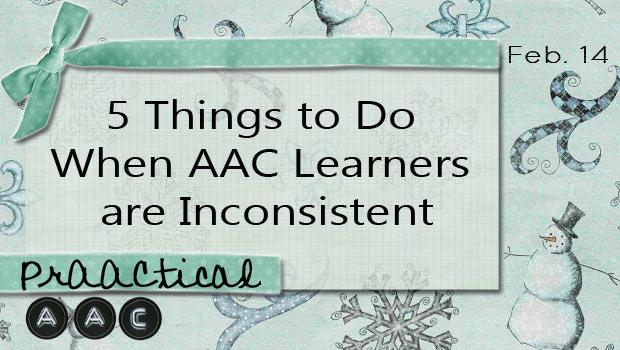
We’ve had some interesting conversations recently with colleagues who firmly believe that AAC learners have to be consistent in the use of their new skills before it’s appropriate to move on. We disagree. There are times when consistency is essential. Crossing the street? Fine. No parent or professional is going to let a learner do that alone until they’re 150% consistent. But for most other things that we teach, it doesn’t make sense to focus on consistency. Here are some of our prAACtical ideas for what to do if you work with learners who are inconsistent in using their AAC skills. 1. Understand it. Inconsistency is a part of the learning process, and not a sign of failure, incompetence, or ‘stubbornness.’ (Ugh! I can’t even write that without that prickly feeling at the back of my neck.) Think about developmental norms for speech sound acquisition. Remember those charts of when... [Read More...]
February 11, 2014
by Carole Zangari -
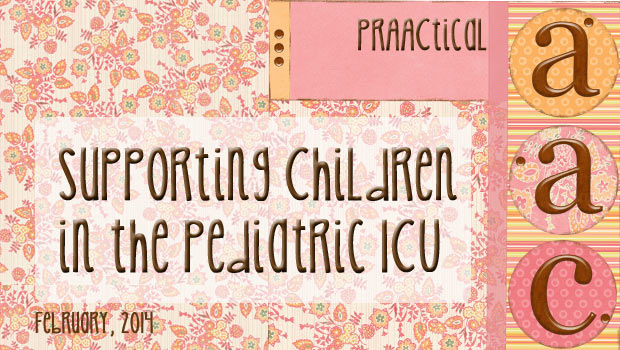
If there is anything scarier than having a very sick child in the ICU, it has to be when that child has no means of communication. In this Research Tuesday post, we join the efforts spearheaded by Rachel Wynn of Gray Matter Therapy to share an article that discusses the issues and presents some solution strategies. When we think of research studies in SLP, we think of experimental designs and randomized controlled trials (RCTs). In AAC, group research designs are uncommon because of the immense heterogeneity of this clinical population. Even limiting the study to one single disorder and age group, say teenagers with dysarthria secondary to cerebral palsy, contains too much heterogeneity for most group research. Instead, we see more single subject design experimental studies (SSEDs) in AAC. When well-designed, SSEDs have strong experimental control and allow researchers to answer causal questions, such as “did the treatment (e.g., teaching... [Read More...]









